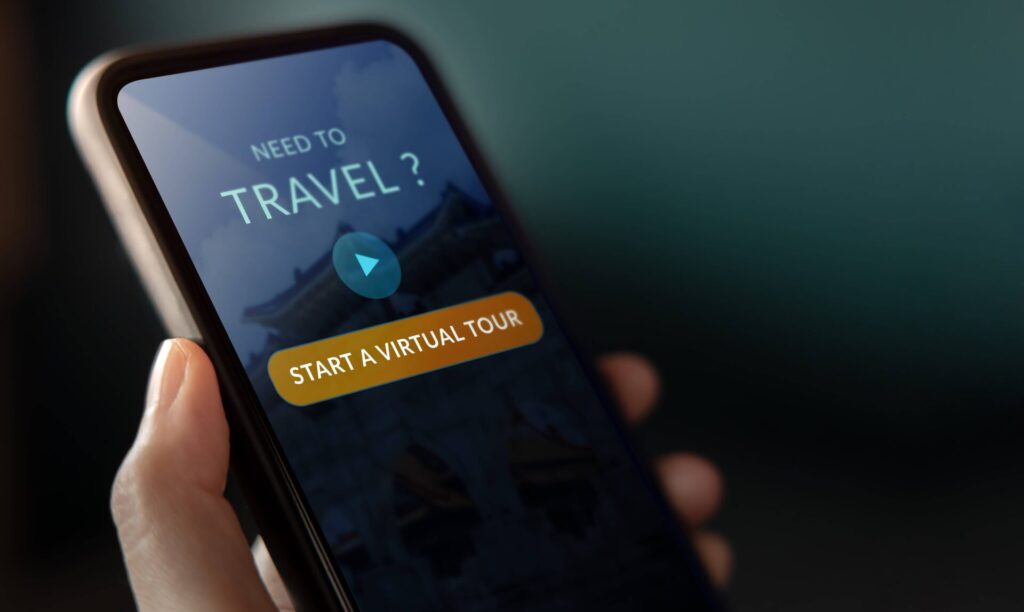Boost Your Real Estate Business with Social Media Marketing
Picture this: a bustling open house, potential buyers eagerly examining every nook and cranny, and a real estate agent skillfully guiding them through the property.
While this scene might seem like a dream scenario, it’s not the only way to find success in the real estate world. Enter social media marketing, an increasingly essential tool in any agent’s arsenal.
In this digital age, real estate professionals must adapt to the ever-changing landscape of marketing and communication. Social media platforms offer a dynamic way to connect with potential clients, showcase properties, and ultimately grow your business.
In comparison to other sources, social media is only surpassed by referrals when it comes to generating real estate leads, as evidenced by a recent 2023 realtor survey.
Consequently, a remarkable 80% of real estate agents are planning to allocate more time to refining their social media marketing tactics in the coming year.
Prospective clients prioritize trust and experience when selecting a real estate agent.
Social media serves a purpose beyond merely facilitating home listing discoveries (although it excels at that). It is a space where you can demonstrate your expertise and start forging relationships – and leads – on an expansive scale.
That’s why we’ve curated a list of 18 creative ideas to help you make a lasting impression on your target audience.
So, buckle up, and let’s dive in!
Leverage Live Tours

Gone are the days when attending open houses in person was the only way to explore a property. Live video tours have emerged as a game-changer in the real estate industry, making property viewing accessible right at your fingertips. I recall hosting a live tour for a stunning penthouse with a breathtaking cityscape view. The engagement and inquiries poured in, and within a week, the property was off the market.
Live tours offer a plethora of advantages. The most significant of these is their ability to expand your reach exponentially. Potential clients from any corner of the globe can attend your virtual tours, opening up a world of possibilities. This innovative method also caters to those with jam-packed schedules or those who face geographical limitations in attending open houses in person.
Furthermore, live tours save time and resources for both agents and clients. They eliminate the need for multiple in-person visits, allowing agents to focus on other aspects of their business. At the same time, clients can view multiple properties without the hassle of traveling from one location to another. In short, embracing live video tours paves the way for a more efficient and successful real estate marketing strategy.
Feature Client Testimonials
The age-old adage “word of mouth” continues to hold weight in the marketing sphere. People inherently trust the opinions and experiences of others when making decisions. This phenomenon, known as social proof, is a powerful tool that can significantly boost your real estate business’s credibility and reputation.
Showcasing client testimonials on your social media channels can work wonders in attracting new prospects. There are several creative ways to present these testimonials, such as eye-catching graphics, captivating video snippets, or even carousel posts featuring multiple reviews. For instance, you could create a short video compilation with clients sharing their positive experiences working with you, followed by an elegant graphic overlay showcasing their heartfelt words.
When selecting testimonials to feature, it’s essential to choose those that demonstrate the unique value you provide as a real estate agent. Look for feedback that highlights your expertise, dedication, and problem-solving abilities. By showcasing genuine, impactful testimonials, you’ll reinforce trust among potential clients and set the stage for future successes in your real estate journey.
Highlight the Neighborhood

- Location matters: Emphasize the importance of the neighborhood for homebuyers, as it contributes significantly to their overall satisfaction and quality of life.
- Showcase Community features: Use your social media posts to highlight local events, businesses, and parks, giving potential clients a glimpse of the lifestyle they can expect in their new home.
- Local events: Share information about farmers’ markets, art fairs, or music festivals happening in the area.
- Businesses: Feature popular cafes, restaurants, or boutiques, possibly collaborating for cross-promotion.
- Parks and recreation: Display nearby parks, walking trails, and outdoor spaces to emphasize community and leisure opportunities.
- Analogies: Describe the neighborhood as a living organism, with various parts working together to create a vibrant, desirable environment.
- Attract clients: By promoting the neighborhood’s charm and uniqueness, you’ll entice potential homebuyers and set your real estate marketing apart from the competition.
Engage with Video Content
- Static images vs. video content: While static images can capture a property’s aesthetics, engaging video content takes it a step further by offering a more immersive experience for potential clients. Videos enable viewers to visualize themselves in the space, building an emotional connection that may be lacking in still images.
- Shareability: Videos tend to be more shareable, increasing the chances of your content reaching a broader audience.
- Engagement: Video content often generates higher engagement rates, including likes, comments, and shares, encouraging potential clients to interact with your brand.
- Creating captivating videos: To produce compelling video content, focus on the following aspects:
- Editing: Utilize professional editing tools to create seamless transitions, add fitting background music, and highlight key features of the property, elevating the overall presentation.
- Storytelling: Craft a narrative around the property that showcases not only its physical attributes but also the emotional aspects of living there. Share anecdotes or unique selling points to create a memorable viewing experience.
- Duration: Keep the video length optimal, striking a balance between providing comprehensive information and maintaining viewer attention.
- Types of video content: Experiment with various formats to cater to different preferences and platforms:
- Virtual tours: Offer 360-degree walkthroughs of properties, allowing viewers to explore every corner from the comfort of their homes.
- Testimonials: Feature video testimonials from satisfied clients to build credibility and trust.
- Neighborhood highlights: Showcase the surrounding community through video featuring local events, businesses, and recreational spaces.
- Potential reach and impact: The reach and impact of video posts can significantly enhance your real estate marketing efforts:
- Greater exposure: Video content, with its higher shareability, can help you tap into new audience segments and expand your client base.
- Memorable experience: The emotional connection forged through video content leaves a lasting impression on viewers, increasing the likelihood of them choosing your services.
- Platform versatility: Videos can be tailored to suit various social media platforms, ensuring maximum visibility and engagement across channels.
Utilize Hashtags Strategically

- Explain how hashtags can increase visibility: Hashtags are an essential tool for increasing the visibility of your social media content. You can increase your audience beyond your direct followers by utilizing relevant and well-liked hashtags to make your posts visible to people who are searching for particular subjects or keyphrases. More engagement, more followers, and greater brand awareness may result from this.
- Provide examples of effective real estate hashtags: When selecting hashtags for your real estate content, consider a combination of general, niche, and location-based tags to maximize your reach. Here are some examples:
- General: #RealEstate, #HomeForSale, #JustListed
- Niche: #LuxuryHomes, #InvestmentProperty, #FirstTimeHomeBuyer
- Location-based: #[YourCity]RealEstate, #[YourNeighborhood]Homes, #[YourState]Properties
- Share a personal anecdote of a well-performing hashtag campaign: One of the most memorable hashtag campaigns I’ve witnessed involved a real estate agent who was trying to sell a unique property with a stunning view. They created a custom hashtag, #RoomWithAView, and shared a series of captivating photos showcasing the view from different angles and times of the day. The campaign generated significant interest and engagement, ultimately leading to a quick sale at a favorable price.
Collaborate with Local Influencers
- Benefits of influencer marketing: Influencer marketing has become increasingly popular due to its ability to reach a wider audience, build credibility, and generate authentic engagement.
- Access to a broader audience: Partnering with local influencers can expose your real estate business to their followers, expanding your reach.
- Enhanced trust: Influencers already enjoy a high level of credibility with their audience, which can help your services appear more credible.
- Genuine engagement: Influencers are able to produce relatable, authentic content that connects with their followers and increases engagement rates.
- Finding and partnering with relevant influencers:
- Research: Do local influencer research to find people who share your target market and your brand’s core principles.
- Outreach: Contact potential partners with a persuasive pitch that emphasizes how the cooperation will benefit both parties.
- Collaboration: Create content with the influencer while keeping the influencer’s distinct voice and style to highlight your assets and services.
- Success story: A collaboration between a real estate agent and a popular home renovation influencer led to a highly engaging series of posts featuring the transformation of a fixer-upper property. The collaboration not only generated substantial interest in the property but also resulted in a surge of inquiries for the agent’s services.
Host Virtual Q&A Sessions

- Addressing potential clients’ concerns: Building trust and rapport with potential customers requires actively listening to and addressing their issues. Virtual Q&A sessions offer a forum for open discussion and showcase your knowledge and dedication to client pleasure.
- Format of a virtual Q&A session: Select an appropriate platform (such as Facebook Live, Instagram Live, or Zoom) to organize a live event where you can respond to inquiries and cover real estate-related topics. Promote the event in advance and invite questions from your audience to increase participation.
- Promoting and hosting a successful event:
- Promotion: Use your social media channels to create awareness about the upcoming Q&A session. Share teasers, post reminders, and encourage your followers to submit their questions beforehand.
- Preparation: Research the most commonly asked questions and prepare well-structured answers. Be ready to address any unexpected inquiries that may arise during the session.
- Interaction: Talk to and interact with your audience by posing questions and inviting them to share their stories. A two-way interaction makes the session more engaging and fun for everyone.
- Follow-up: After the event, post highlights on your social media platforms and express gratitude to the attendees for coming. Continue interacting with your audience, and be sure you address any queries that remain unanswered.
Share Behind-the-Scenes Content
- Authenticity in marketing: Modern consumers appreciate authenticity and transparency in marketing. Showcasing the human side of your real estate business can help you connect with your audience on a personal level and differentiate yourself from competitors.
- Ideas for behind-the-scenes content:
- Day-in-the-life: Offer a glimpse into your daily routine as a real estate agent, sharing challenges, successes, and personal anecdotes.
- Project progress: Document the process of transforming a property, from initial staging to the final sale, to demonstrate your expertise and commitment to quality.
- Reinforce trust and credibility: Sharing behind-the-scenes content humanizes your brand, allowing potential clients to see the hard work and dedication that goes into providing exceptional service. This transparency can reinforce trust and credibility, making clients more likely to choose your services over competitors.
Build and Distribute Educational Blog Posts

• Importance of original research and educational content: By offering insightful, thoroughly researched, and instructive content, you may establish yourself as an authority in the real estate sector. Potential clients who are looking for professional direction and counsel in their home-buying process may be drawn to this strategy.
• Advice for crafting interesting blog posts:
Keep your audience in mind: Create content that speaks to the needs, interests, and questions of your intended audience to make it interesting and relevant.
· Be succinct and explicit: To successfully communicate your point, use simple language and short sentences.
· Include images: Add pictures, infographics, and videos to your information to improve the reader’s experience and make it stick in their minds.
· How to organize your content: Make your information more readable and comprehensible by organizing it with headings, subheadings, and bullet points.
- Ideas for blog post topics:
- Market trends: Analyze and share insights on local real estate market trends, helping clients make informed decisions.
- Home improvement tips: Offer advice on cost-effective renovations or DIY projects that can boost a property’s value and appeal.
By creating and sharing informative blog posts, you demonstrate your expertise and commitment to educating your audience, further enhancing your credibility and trustworthiness in the real estate industry.
Embrace User-Generated Content
- Concept of user-generated content (UGC): UGC refers to content created by individuals outside of your business, such as clients or followers, that features or promotes your brand. In the context of real estate marketing, this can include client photos, stories, testimonials, or experiences related to your services.
- Examples of UGC in real estate marketing:
- Client photos: Encourage clients to share images of their new homes, showcasing their personal touches and decor.
- Stories: Invite clients to share their home-buying journey or how your services made a difference in their experience.
- Tips on encouraging clients to share their experiences:
- Create a branded hashtag: Develop a unique hashtag for your real estate business and encourage clients to use it when sharing their content.
- Feature UGC on your channels: Share user-generated content on your social media profiles or website, giving credit to the creators and expressing gratitude for their contributions.
- Offer incentives: Provide incentives for clients to share their experiences, such as exclusive discounts or entry into a giveaway.
Run Social Media Contests

- Traditional marketing tactics vs. social media contests: While traditional marketing methods can be effective, social media contests tap into the power of engagement, shareability, and virality, resulting in broader brand awareness and deeper connections with your audience.
- Benefits of contests:
- Engagement: Contests encourage active participation from your audience, leading to increased likes, comments, and shares on your social media channels.
- Brand awareness: As participants share contest details with their networks, your brand can reach new potential clients.
- Ideas for real estate-themed contests and giveaways:
- Photo contest: Ask participants to share pictures of their dream homes using a designated hashtag and tagging your account.
- Trivia contest: Test your followers’ knowledge of local real estate market trends or home improvement tips, offering prizes for correct answers.
- Giveaways: Partner with local businesses to create a prize package that showcases the lifestyle and amenities of a particular neighborhood.
Experiment with New Platforms
- Importance of staying ahead of the curve: In the ever-evolving world of social media, it’s crucial to stay informed about emerging platforms and trends. Early adoption can provide a competitive edge, allowing you to reach new audiences and establish a presence before the platform becomes saturated.
- Personal experience trying a new social media platform: For instance, when the short-form video app TikTok gained popularity, I quickly recognized its potential for real estate marketing. By creating entertaining and informative content, I managed to attract a new demographic of potential clients and expand my reach.
- Tips on identifying emerging platforms and adjusting strategies:
- Research: Stay up-to-date with industry news and trends to identify new platforms that show potential for growth.
- Test and learn: Experiment with different types of content and strategies to determine what resonates with the platform’s user base.
- Adapt: Be ready to adjust your approach as platforms evolve and user preferences shift. Continually refine your strategy to ensure maximum engagement and results.
Use social media advertising on Twitter, Facebook, and Instagram

• Social media advertising’s potential reach: Social media advertising gives you the chance to target particular demographics, interests, and behaviors, allowing you to get in front of a highly relevant audience. Your real estate ads could reach a huge audience thanks to the active user bases on social media sites like Facebook, Instagram, and LinkedIn, which number in the billions.
• Facebook Advertising: You may customize a number of ad styles on Facebook, including lead, carousel, and video advertisements, to meet your real estate marketing objectives. You may reach potential customers depending on their location, demographics, hobbies, and habits, thanks to its wide targeting options. To reach users who have already interacted with your website or listings, use Facebook’s retargeting tool.
· Carousel Ads: Showcase multiple properties in a single ad unit, giving users the ability to swipe through different listings and explore their features.
- Lead Ads: Generate leads directly within Facebook by creating ads with pre-filled forms, making it easy for users to express interest in your services.
Instagram Advertising: As a visually driven platform, Instagram is perfect for showcasing stunning property images and videos. Utilize Instagram’s ad formats like Stories ads, photo ads, and video ads to reach a younger demographic and build brand awareness.
- Stories Ads: Create full-screen, immersive ads that appear between users’ Stories. Use captivating images or short videos to capture your audience’s attention and promote your listings.
- Video Ads: Develop engaging video content that showcases properties, highlights your expertise, or tells a story about the community you serve. Utilize Instagram’s targeting capabilities to reach the right audience.
- Twitter Advertising: Twitter can be an effective platform for promoting your real estate services, especially if you have a strong, engaged following. Utilize Twitter’s ad options like Promoted Tweets and Website Cards to drive traffic to your listings, share market insights, or promote your blog content.
- Promoted Tweets: Boost the visibility of your tweets by promoting them to a wider audience. Use attention-grabbing headlines, images, or videos to encourage users to click through to your listings or website.
- Website Cards: Drive users directly to your website or listings with a visually appealing ad format that includes a clickable image, a brief description, and a call-to-action button.
- Crafting effective ad campaigns:
- Targeting: Define your target audience based on factors like location, age, income, and interests to ensure your ads are reaching the right people.
- Budget: Allocate an appropriate budget for your campaign, considering factors like audience size, platform, and ad format. Monitor your ad performance to optimize your budget allocation.
- Creativity: Develop eye-catching visuals and compelling copy to capture your audience’s attention and drive engagement.
Optimize Your Social Media Profiles
- Importance of a professional online presence: A polished, professional online presence is crucial for credibility and visibility in the competitive real estate market. Your social media profiles are often the first point of contact for potential clients, so it’s essential to make a strong first impression.
- Tips on optimizing profiles for visibility and credibility:
- Profile photo: Use a high-quality, professional headshot that portrays you as approachable and trustworthy.
- Bio: Craft a compelling bio that highlights your expertise, services, and unique selling points. Be sure to include relevant keywords to improve your searchability.
- Consistency: Maintain a consistent visual and tonal identity across all your social media channels, reinforcing your brand image.
- Contact information: Provide clear, up-to-date contact details and links to your website or listings, making it easy for clients to reach you.
- Examples of well-optimized real estate profiles: An agent with a professional headshot, a concise bio outlining their experience and specialization in luxury properties, and a cohesive visual theme across their posts exemplifies an optimized real estate profile.
Monitor and Engage with Your Audience
- The significance of active social media management: Social media is an effective instrument for developing rapport and audience trust. Active interaction with your followers shows that you care about client happiness and encourages the development of brand evangelists.
- Advice for observing and answering messages and comments:
• Pay attention: Keep a close eye on your social media platforms for messages, comments, and mentions to make sure you don’t miss any chances to interact with your audience.
- Respond promptly: Address questions and concerns in a timely manner, showcasing your dedication to providing excellent customer service.
- Be genuine: Personalize your responses to show your appreciation for your followers and their feedback.
Showcase “Just Sold” Photos

- Purpose of “Just Sold” photos: Celebrating your recent sales on social media with “Just Sold” photos highlights your success as a real estate agent, demonstrates your expertise, and builds trust with potential clients. These photos can also inspire and motivate other homebuyers, generating interest in your services.
- Tips for creating engaging “Just Sold” photos:
- Quality: Use high-resolution, well-lit images that showcase the property in the best possible light. If possible, hire a professional photographer to capture the perfect shot.
- Emotion: Capture the excitement of the new homeowners in the photo, as this emotion can be contagious and encourage others to envision themselves in a similar situation.
- Personal Touch: Include a brief, heartfelt caption that tells the story behind the sale, highlighting the challenges overcome or the unique aspects of the transaction. This personal touch helps humanize the process and makes it more relatable for your audience.
- Call to Action: Encourage engagement by inviting your followers to share their thoughts, congratulate the new homeowners, or reach out to you for assistance with their own real estate needs.
- Examples of “Just Sold” photos:
- A photo of the new homeowners holding a “Just Sold” sign in front of their property, with a caption detailing their journey to find the perfect home.
- A collage of images showcasing the property’s most attractive features, accompanied by a caption highlighting the unique selling points that led to a successful sale.
Client Appreciation Events
- Purpose of client appreciation events: Hosting client appreciation events is an excellent way to thank your clients for their trust and support, strengthen your relationships, and generate referrals. These events can range from informal gatherings to more elaborate celebrations, depending on your client’s preferences and your budget.
- Tips for planning and promoting client appreciation events:
- Personalization: Tailor the event to your client’s interests and preferences, ensuring it is a memorable and enjoyable experience for all attendees. Consider factors such as the type of event, venue, and entertainment options.
- Invitations: Send personalized invitations to your clients, expressing your gratitude for their support and providing all the necessary event details. Be sure to ask for RSVPs to help with planning and logistics.
- Promotion: Share updates and teasers about the event on your social media channels, building anticipation and excitement among your followers. This can also serve as a reminder for those who haven’t yet RSVP’d.
- Engagement: Encourage interaction and engagement during the event by organizing games, contests, or icebreakers that promote mingling and conversation. Capture moments from the event and share them on social media, allowing your clients to tag themselves and share them with their networks.
- Follow-up: After the event, express your gratitude by sending thank-you notes to attendees and sharing a recap on social media, showcasing the highlights and key moments.
- Examples of client appreciation events:
- A wine and cheese tasting event at a local winery, offering clients the opportunity to relax, socialize, and enjoy some delicious treats.
- A family-friendly picnic at a local park, complete with games and activities for all ages, allowing clients to bring their children and make it a fun day for the entire family.
Home Maintenance Tips

- Purpose of sharing home maintenance tips: Providing valuable home maintenance tips on your social media channels showcases your expertise and commitment to helping clients beyond the sale. This can also create opportunities for engagement, as followers may ask questions or share their own experiences.
- Tips for creating and sharing engaging home maintenance content:
- Relevance: Focus on tips that are relevant to your audience’s needs and interests. Consider factors like regional weather conditions, local regulations, or common property types in your area.
- Variety: Offer a mix of tips that cater to different aspects of home maintenance, such as seasonal tasks, energy efficiency, and safety measures.
- Visuals: Use eye-catching visuals like infographics, photos, or short videos to illustrate your tips and make the content more engaging.
- Simplicity: Break down complex tasks into easy-to-follow steps, making the information more accessible and actionable for your audience.
- Resources: Share links to reliable resources or tools that can help your clients with home maintenance tasks, reinforcing your credibility and adding value to your content.
- Examples of home maintenance tips:
- Seasonal: Share a checklist of essential tasks to prepare a home for the upcoming season, such as cleaning gutters, sealing windows, or servicing HVAC systems.
- Energy Efficiency: Offer tips on how to reduce energy consumption and lower utility bills, such as installing a programmable thermostat or adding insulation.
- Safety Measures: Provide advice on maintaining a safe home environment, like testing smoke and carbon monoxide detectors or securing heavy furniture to prevent accidents.
Conclusion: Embrace the Power of Social Media Marketing for Real Estate Success
Social media has established itself as a crucial tool for real estate professionals, enabling them to successfully reach a wider audience, foster trust, and create leads than they could with more conventional marketing strategies. You can maximize your social media presence and advance your real estate business by embracing a wide variety of imaginative and engaging material, such as displaying new listings, utilizing live tours, and working with regional influencers.
Success in the industry depends on being ahead of the curve and changing your marketing strategy as the digital landscape changes. You may not only stay competitive by putting time and effort into improving your social media marketing strategies, but you can also build a more solid reputation as a dependable and knowledgeable real estate agent. So get started with these real estate-related post ideas, and watch as your online presence grows and eventually produces worthwhile leads and customers.
